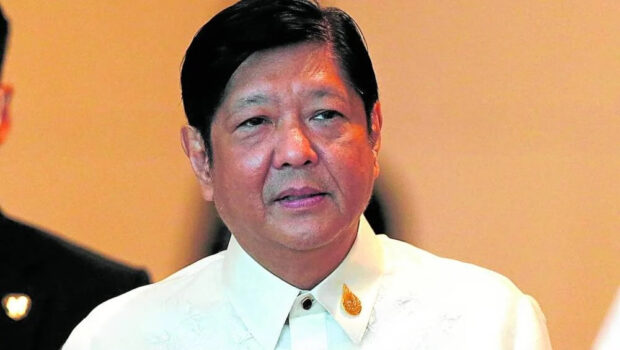
FILE PHOTO: President Ferdinand Marcos, Jr. Photo by RAY ZAMBRANO
WASHINGTON—President Marcos on Wednesday (Thursday in Manila) urged the United States to renew the duty-free privilege given to thousands of Philippine export products to help the country recover from the pandemic, emphasizing that the economic relations between the two allies should not be left behind while both countries fortify their defense cooperation.
Addressing a business forum here attended by some of the country’s major business tycoons accompanying the Chief Executive in his official visit, among them Kevin Tan of Megaworld, Jaime Augusto Zobel de Ayala of Ayala Group, port magnate Enrique Razon and Tessie Sy-Coson of SM Investments Inc., Marcos made the pitch for the renewal of the US Generalized System of Preferences (GSP) two days after meeting with US President Joe Biden at the White House.
It was not clear, however, if Marcos had mentioned the matter during his bilateral meeting with Biden, wherein the US president reaffirmed his country’s commitment to the Philippines under the two nations’ 1951 Mutual Defense Treaty.
Marcos said the country’s ties with its traditional defense and trade partner are the “front and center right now” after surviving “some bumps and scrapes.” Such relations hit a low point during the previous Duterte administration, which veered away from the United States and expanded economic relations with China.
“We would like to request for reauthorization (under the GSP)… to boost trade and to make US products that are made in the Philippines more competitive,” the President said at the forum.
“And [while] the security and defense [sectors] are top of mind, we also have to see that it is very hard for us to separate and say that this is a discreet sector that does not affect any other sector,” he pointed out.
Prior to its expiration, the Philippines ranked fifth among the GSP beneficiaries after Thailand, Indonesia, Brazil and Cambodia.
Benefits to exporters
The US GSP is a program that provides opportunities for many poor and developing countries to use trade to grow their economies. Established in 1974, it eliminates duties on a long list of products when imported by American companies from designated beneficiary countries.
However, the Philippines’ eligibility to export more than 5,000 products such as electronics and agricultural items duty-free expired at the end of 2020, with $1.6 billion worth of shipments benefiting from the GSP program that year alone.
In the Asia-Pacific bulletin published in June last year by the US government-run East-West Center, it said that since Manila’s eligibility expired in 2020, American firms importing from the Philippines paid $121 million in extra tariff on $1.9 billion worth of goods that would have otherwise qualified under the GSP.
The think tank also backed the renewal of the Philippines’ inclusion in the trade program, noting that the GSP was a “valuable tool in strengthening Philippine-US trade.”
The Philippine government has been persistently lobbying for the renewal of the GSP privilege, the latest attempt of which was during the official visit to Manila of US Trade Rep. Katherine Tai last April 16-18.
In a media briefing during her trip, Tai assured the government of her support for the Philippines’ reinstatement in the GSP program.
“I have expressed my support to the (US) Congress for [it] to reauthorize, but that action must be taken by the US Congress,” Tai said.
However, the US Congress is considering other issues in renewing the GSP for the Philippines, including human rights and labor issues.
According to the visiting US trade representative in Manila, their legislature is also looking into adding the environmental criterion to the trade preference program, and that the Biden administration also wants a labor-centered trade to help improve the lives of workers.
“And we have to think about advancing a trade policy that is going to be good for not just consumers, but workers because people have many facets. So in our engagements with all of our trade partners, I will often visit not just my trade counterpart, but also my labor counterpart,” she added.
Sidelined
Last January, Philippine Ambassador to Washington Jose Manuel Romualdez said the renewal of the Philippines’ and other countries’ participation in the GSP program was taking a back seat due to the attention being given to the US-led trade deal called Indo-Pacific Economic Framework for Prosperity (Ipef).
“There has been some movement in that direction (for GSP renewal) but unfortunately because of a lot of developments, especially on the new Ipef, which basically touches on a lot of the trade issues surrounding the Association of Southeast Asian Nations region, there is that delay on specific GSPs that we’re all working on,” he said.
7.6-percent growth
The Ipef was launched by Biden last year in a bid to increase the economic engagement of the United States in the Indo-Pacific region. Aside from the United States and the Philippines, the members of Ipef include Australia, Brunei, Fiji, India, Indonesia, Japan, South Korea, Malaysia, New Zealand, Singapore, Thailand and Vietnam.
Meanwhile, in his speech before American businessmen here, Mr. Marcos invited them to invest in the Philippines, boasting that the Philippine economy grew by 7.6 percent in 2020.
His administration, he added, was doing its best to “create an atmosphere that is attractive to potential investors.”
“We will never, at any point, say we got it perfected. We will continue to listen to you and to all our other partners as to what else we can do to help transform our economy,” Marcos said.

